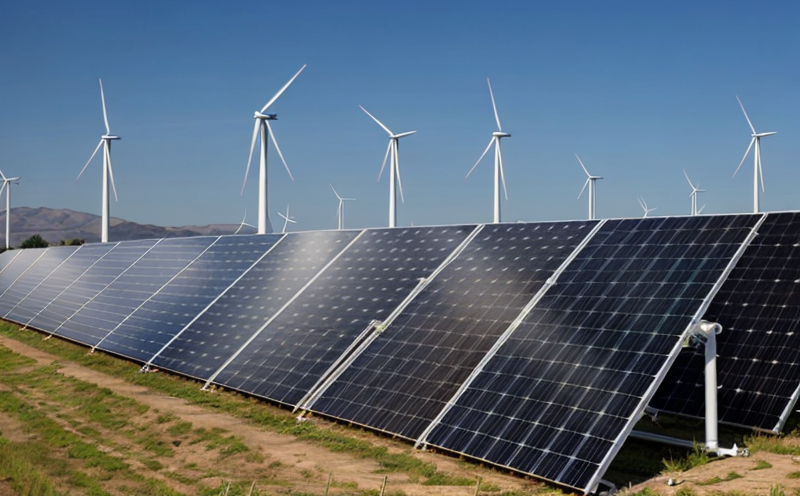ISO 21498 Power Electronics Reliability Testing for Renewable Grids
The ISO 21498 series of standards provides a comprehensive framework to ensure the reliability and safety of power electronics in renewable energy systems. This service focuses on the rigorous testing required by ISO 21498-2, which specifies test methods for assessing the environmental stress qualification (ESQ) of power electronic equipment used in renewable energy grids.
The primary goal of this testing is to ensure that the power electronics within renewable energy systems can withstand the harsh conditions encountered during their operational life. These conditions include extreme temperatures, humidity, salt spray, and dust exposure. The standard's rigorous protocols aim to identify potential failures early on, ensuring that products are reliable under real-world operating conditions.
The testing process involves multiple stages, each designed to simulate specific environmental stresses. Specimens undergo thermal cycling, humidity stress, salt fog corrosion tests, and sanding tests. These tests help in identifying any weaknesses or vulnerabilities in the design of the power electronics. After successful completion of these tests, a detailed report is generated, providing insights into the specimen's performance under simulated conditions.
The ISO 21498 standard also encompasses testing for mechanical stress, electrical stress, and electromagnetic compatibility (EMC). Mechanical stress testing ensures that components can withstand physical shocks and vibrations. Electrical stress tests verify the capability of power electronics to handle overloads and transients without failure. EMC tests ensure that equipment does not emit excessive levels of electromagnetic interference.
Our laboratory adheres strictly to ISO 21498 protocols, ensuring accurate and reliable test results. We use state-of-the-art equipment and follow internationally recognized standards to provide our clients with a high level of confidence in the performance of their renewable energy systems. Our service ensures that products meet stringent safety and reliability criteria, thereby enhancing overall grid stability.
For quality managers, compliance officers, R&D engineers, and procurement teams, this service offers critical insights into the durability and effectiveness of power electronics used in renewable energy systems. By partnering with us, you can ensure your products meet the highest industry standards, thereby reducing the risk of costly failures and enhancing customer satisfaction.
Applied Standards
The ISO 21498 series has been widely recognized for its comprehensive approach to power electronics reliability testing. The primary standard relevant to this service is ISO 21498-2, which focuses on environmental stress qualification. This standard is applicable across various sectors, including wind energy, solar photovoltaics, and hybrid systems.
The application of ISO 21498 extends beyond renewable energy testing to other critical sectors such as aerospace, automotive, and industrial manufacturing. In the context of renewable energy, these standards ensure that power electronics can operate reliably in harsh environmental conditions without compromising safety or performance.
Our laboratory ensures compliance with all relevant international standards, including ISO 21498-2, to provide accurate and reliable testing results. By adhering to these global benchmarks, we guarantee the highest level of quality assurance for our clients' products.
International Acceptance and Recognition
The international recognition and acceptance of ISO 21498 standards have made them a cornerstone in the renewable energy industry. These standards are widely accepted by regulatory bodies, manufacturers, and end-users globally. The rigorous testing protocols outlined in these standards ensure that products meet stringent reliability and safety criteria.
Many countries and regions have adopted ISO 21498 as a benchmark for power electronics reliability testing. This adoption is driven by the need to enhance grid stability and reduce the risk of failures in renewable energy systems. By adhering to these internationally recognized standards, manufacturers can ensure their products are safe, reliable, and compliant with global regulations.
Our laboratory's adherence to ISO 21498 ensures that our clients' products meet the highest international standards. This compliance enhances the reputation of your brand in the global market and demonstrates a commitment to quality and safety.
Use Cases and Application Examples
| Use Case | Description |
|---|---|
| Wind Turbine Power Electronics | Testing power electronics used in wind turbines to ensure they can withstand extreme environmental conditions, including high winds and varying temperatures. |
| Solar Inverter Reliability | Evaluating the reliability of solar inverters under harsh weather conditions such as humidity, salt spray, and dust exposure. |
| Hybrid System Components | Testing components in hybrid systems to ensure they can operate reliably under diverse environmental stresses. |
| Grid Integration Testing | Evaluating the performance of power electronics during integration into renewable energy grids, ensuring seamless and stable operation. |
| Aerospace Power Electronics | Testing aerospace-grade power electronics to ensure they can operate reliably in harsh environmental conditions, including high altitudes and extreme temperatures. |
| Automotive Electronics | Evaluating the reliability of automotive power electronics under various stressors such as mechanical shocks and electromagnetic interference. |
| Industrial Equipment Power Electronics | Testing industrial equipment power electronics to ensure they can operate reliably in challenging environments, including high humidity and dust exposure. |
The use cases listed above demonstrate the versatility of ISO 21498 testing. This service is applicable across a wide range of industries and applications, ensuring that power electronics used in renewable energy systems are reliable and safe under real-world conditions.





